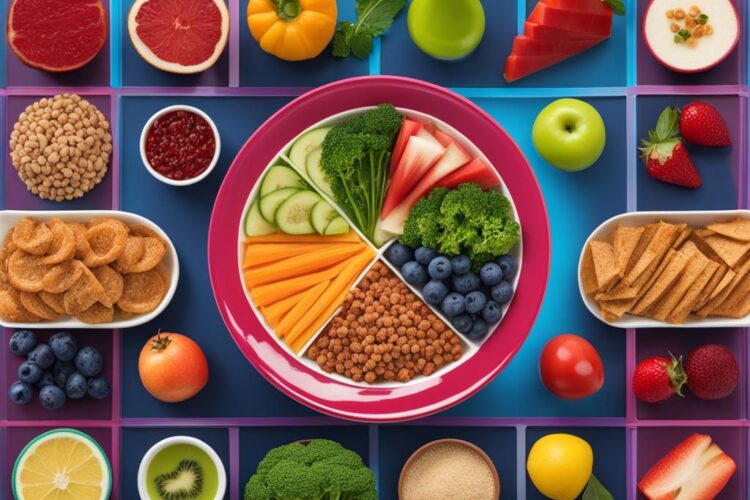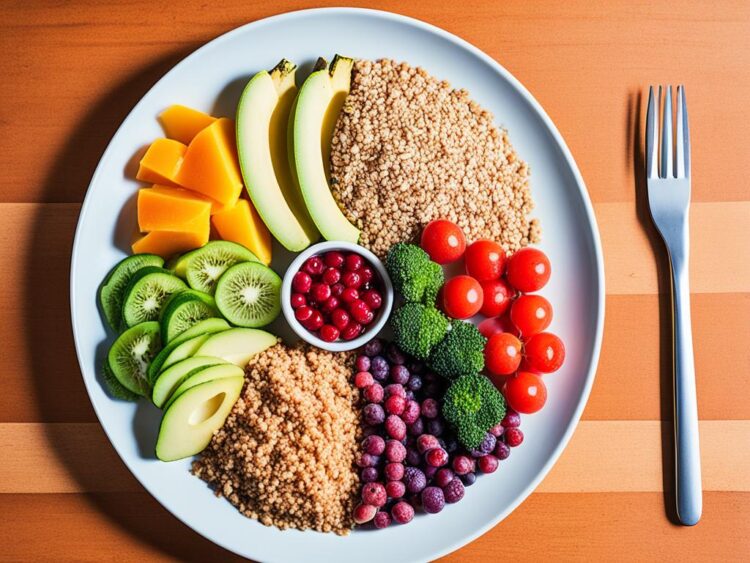Are you looking to achieve your weight and fitness goals? Calorie counting is a powerful tool that can help you on your journey towards a healthier and happier lifestyle. By tracking your calorie intake and managing your daily calorie goals, you can take control of your weight management and make informed choices about your nutrition.
But don't worry, calorie counting doesn't have to be complicated. With the help of a calorie calculator and a few simple strategies, you can simplify the process and set yourself up for success. In this article, I will guide you through the basics of calorie counting for healthy living.
Stay tuned to discover the benefits of calorie counting, how to determine your ideal calorie intake, the best apps to assist you, portion measurement tips, the importance of diet quality, and valuable tips to ensure your calorie counting journey is a success.
Key Takeaways:
- Calorie counting is an effective method for weight management and achieving health goals.
- Using a calorie calculator helps determine your ideal calorie intake.
- There are various apps available to simplify calorie counting and food tracking.
- Accurate portion measurement is crucial for effective calorie counting.
- While calories are important, the quality of your diet matters for overall health and well-being.
Why Calories Count
When it comes to weight management, understanding the role of calories is crucial. Whether your goal is weight gain or weight loss, it all boils down to the balance between the calories you consume and the calories you burn. Counting calories allows you to create a calorie deficit or surplus, depending on your desired outcome, making it an effective tool for managing your weight and achieving your goals.
A calorie deficit occurs when you consume fewer calories than you burn, resulting in weight loss. On the other hand, a calorie surplus happens when you consume more calories than you burn, leading to weight gain. By monitoring your calorie intake and adjusting it accordingly, you can take control of your weight and work towards your ideal body composition.
Keeping track of your calories not only provides a clear picture of your energy balance but also encourages mindful eating habits. It helps you become more aware of the nutritional value of the foods you consume, making it easier to make informed choices and prioritize nutrient-dense options. Calorie counting serves as the foundation for effective weight management, enabling you to make progress towards your desired weight and overall well-being.
“Calorie counting allows you to take control of your weight and work towards your ideal body composition.”
By focusing on calorie counting, you are equipping yourself with a powerful tool for weight management. However, it's essential to remember that the quality of your diet matters just as much as the quantity of calories consumed. Opting for nutrient-dense foods that provide essential vitamins, minerals, and macronutrients is key to supporting your weight loss or weight gain journey and promoting overall health.
Take a moment to truly grasp the significance of calories and the impact they have on your weight management journey. Counting calories empowers you to take charge of your body, better understand your nutritional needs, and make sustainable changes in your lifestyle. Now, let's explore how to determine the right calorie intake and create a calorie deficit for successful weight loss, which we'll cover in the next section.
How Many Calories Should You Eat?
When it comes to weight loss, determining your calorie intake is key. The number of calories you should consume depends on various factors, including your gender, age, weight, and activity level. To find out the right calorie intake for you, I recommend using a calorie calculator or consulting with a registered dietitian. This will help you establish a baseline and set realistic goals for your weight loss journey.
Creating a calorie deficit is crucial for successful weight loss. This means consuming fewer calories than you burn through physical activity and daily functions. By doing so, your body starts using stored fat as an energy source, leading to steady and sustainable weight loss over time.
Calculating your daily calorie deficit can be done in a simple and straightforward manner. Using a calorie calculator provides an accurate estimate of your calorie needs based on your goals and activity level. For effective weight loss, a daily deficit of 500 to 1000 calories is generally recommended, resulting in a weekly weight loss of 1 to 2 pounds.
“Remember, sustainable weight loss is a journey, not a race. It's important to make gradual changes to your calorie intake and adopt healthy habits along the way.”
The Role of Calorie Counting Apps
Calorie counting apps can be incredibly helpful in tracking your calorie intake and maintaining a calorie deficit. These apps allow you to log your food and beverages, providing an easy way to keep track of your daily calorie consumption. Many apps also offer features like barcode scanning to quickly input nutritional information and progress tracking to monitor your weight loss journey.
By using a calorie counting app, you can stay accountable to your weight loss goals and gain a better understanding of the nutritional value of the foods you consume. It's important to choose a reputable app that suits your individual needs and preferences. Some popular options include MyFitnessPal, Lose It!, and FatSecret.
Remember, calorie counting is just one aspect of a healthy lifestyle. It's essential to prioritize nutrient-dense foods, regular physical activity, and overall well-being. By combining calorie counting with a well-rounded approach, you can achieve your weight loss goals and maintain a healthy lifestyle in the long term.
The Best Apps to Help You Count Calories
Technology has revolutionized the way we track our calorie intake and manage our weight. With the abundance of calorie counting apps available, it has never been easier to stay on top of your nutrition goals. These apps provide a simple and convenient way to log your food intake and effortlessly track your calorie consumption throughout the day. By leveraging the power of these apps, you can take control of your diet and achieve your weight management objectives.
When it comes to calorie counting apps, there are several popular options to consider:
- My Fitness Pal: This comprehensive app offers a vast food database and allows you to track both calories and macronutrients with ease. It also syncs with fitness trackers, helping you monitor your exercise and calorie expenditure.
- Lose It!: A user-friendly app that enables you to set personalized calorie goals and provides insights into your daily nutritional intake. It also offers social features, allowing you to connect with a supportive community.
- FatSecret: With its extensive food diary and barcode scanning capabilities, FatSecret makes it effortless to log your meals for accurate calorie tracking. It also offers meal planning and recipe ideas to support your weight management journey.
- Cron-o-meter: Ideal for individuals who want to track not only calories but also specific micronutrients, Cron-o-meter provides detailed insights into your nutritional intake. It is particularly helpful for those following specialized diets or with specific dietary requirements.
- SparkPeople: More than just a calorie counting app, SparkPeople offers a comprehensive platform for all aspects of weight management. It provides access to recipes, workout routines, and a supportive community to keep you motivated and on track.
These apps offer a range of features to suit different preferences and goals. Whether you are looking for a simple calorie tracker or a holistic weight management solution, there is an app out there to support you in your journey.
Using calorie counting apps can enhance your overall experience and improve your weight management efforts. With convenient access to accurate food tracking and detailed calorie intake information, you can make informed choices about your diet and take steps towards achieving your desired health outcomes.
Remember, staying mindful of your calorie intake is a crucial component of successful weight management. By harnessing the power of technology through calorie counting apps, you can empower yourself to make healthier choices and embark on a more balanced and fulfilling lifestyle.
How to Weigh and Measure Your Portions
To ensure accurate calorie counting, it's essential to measure your food portions accurately. Proper portion control is key to maintaining a healthy diet and achieving your weight goals. Here are some tips on how to measure your portions effectively:
- Use Kitchen Tools: Invest in a reliable kitchen scale and measuring cups to accurately measure your food portions. Weighing your food can provide a more precise measurement than using volume-based cups.
- Visual Comparisons: If you don't have measuring tools, you can use visual comparisons to estimate portion sizes. For example, a serving of meat should be about the size of a deck of cards, and a serving of pasta or rice should be about the size of a tennis ball.
- Reading Labels: When measuring packaged foods, refer to the nutrition label for serving size information. Pay attention to the number of servings per container to avoid consuming more calories than you realize.
- Online Calorie Databases: For fresh foods without nutrition labels, use online calorie databases or smartphone apps to find the calorie content of common ingredients. These resources can help you estimate portion sizes accurately.
- Restaurant Challenges: Eating out can make portion control more challenging, but many restaurants now provide calorie information upon request. Ask for nutrition facts or make healthier choices by opting for grilled or steamed dishes, and splitting meals with a friend.
By mastering portion control and accurate food measurement, you'll have a better understanding of your calorie intake and be able to manage your weight more effectively. Remember, a little effort in portion measuring goes a long way in achieving your health goals.
The Importance of Portion Control
“Portion control is the key to success in calorie counting. It helps us become more aware of what we eat and prevents overeating, ultimately leading to better weight management.” – Nutritionist Sarah Johnson
The Quality of Your Diet Still Matters
While counting calories is important for weight management, it is equally important to focus on the quality of the diet. Not all calories are created equal, and the nutritional content of foods plays a significant role in overall health. A diet based on nutrient-dense foods, such as fruits, vegetables, whole grains, lean proteins, and healthy fats, promotes better health and can aid in weight loss.
When it comes to diet quality, it's about choosing foods that are rich in essential nutrients and low in added sugars, saturated fats, and sodium. These nutrient-dense foods provide the body with the necessary vitamins, minerals, and antioxidants for optimal functioning.
Benefits of Nutrient-Dense Foods
Consuming nutrient-dense foods offers several benefits for weight loss and overall health:
- Weight Loss: Nutrient-dense foods are generally lower in calories and higher in fiber, which can help promote satiety and prevent overeating. They provide the necessary nutrients while aiding in calorie control.
- Improved Nutrition: Nutrient-dense foods are packed with vitamins, minerals, and other essential nutrients that support optimal health, including immune function, bone strength, and energy levels.
- Reduced Disease Risk: A diet rich in nutrient-dense foods has been linked to a lower risk of chronic diseases such as heart disease, type 2 diabetes, and certain cancers.
- Increased Energy: Nutrient-dense foods provide a steady source of energy, helping to fuel the body throughout the day and support physical activity.
- Improved Digestion: The fiber found in nutrient-dense foods aids in digestion, promotes gut health, and can help prevent constipation.
By incorporating these foods into your diet, you not only improve your overall health but also enhance your weight loss efforts. Focus on making nutrient-dense choices at each meal to maximize the benefits.
Here is an example of a nutrient-dense meal plan:
| Meal | Food Options |
|---|---|
| Breakfast | Egg omelet with spinach, tomatoes, and mushrooms Whole grain toast with avocado |
| Lunch | Grilled chicken salad with mixed greens, bell peppers, and balsamic vinaigrette Side of quinoa |
| Snack | Greek yogurt with berries |
| Dinner | Salmon fillet with roasted Brussels sprouts and sweet potatoes Side of brown rice |
| Snack | Raw almonds and apple slices |
It's important to remember that diet quality goes beyond just counting calories. By prioritizing nutrient-dense foods, you can enhance your weight loss journey and improve your overall health. So, make sure to choose wisely when planning your meals and nourish your body with the nutrients it needs for optimal well-being.
5 More Tips to Succeed With Calorie Counting
In addition to the basic principles of calorie counting, there are a few extra tips that can help you achieve even greater success in your weight loss journey. By incorporating these strategies into your routine, you can make your calorie tracking efforts more effective and maintain a healthy eating pattern.
- Be Prepared: Plan your meals in advance and prepare nutritious snacks to have on hand. This will reduce the temptation to reach for unhealthy options when hunger strikes. Having healthy foods readily available makes it easier to stay on track with your daily calorie goals.
- Read Food Labels: Pay attention to the nutrition labels on packaged foods. Look for serving sizes, calorie content, and other important information. It's important to be aware of the calories and nutrients you are consuming to make informed choices and stay within your calorie limits.
- Remove Tempting Unhealthy Foods: Clear your pantry and refrigerator of foods that are high in calories and low in nutritional value. When unhealthy options are out of sight, they are less likely to tempt you. Instead, stock up on nutrient-dense foods that align with your weight loss goals.
- Aim for Slow and Steady Weight Loss: While it can be tempting to aim for rapid weight loss, it's generally more sustainable and healthier to focus on gradual weight loss. Aim for a loss of 1-2 pounds per week. This allows your body to adjust to the changes and helps maintain lean muscle mass.
- Fuel Your Body with Proper Nutrition for Exercise: If you incorporate exercise into your weight loss journey, make sure to fuel your body with the right nutrients before and after workouts. This helps optimize your performance and recovery, allowing you to get the most out of your fitness routine.
By implementing these five tips, you can enhance the effectiveness of your calorie counting efforts and support your overall health and weight management goals.
Conclusion
Calorie counting is an essential tool for achieving healthy living and successful weight management. By diligently tracking calorie intake and creating a calorie deficit or surplus, individuals can effectively reach their weight goals. It provides a structured approach that empowers individuals to take control of their eating habits and make informed decisions about their nutrition.
However, it's important to remember that calorie counting is not the only factor in achieving optimal health. The quality of the diet is equally crucial. By focusing on nutrient-dense foods such as fruits, vegetables, whole grains, lean proteins, and healthy fats, individuals can nourish their bodies while managing their weight.
To enhance the effectiveness of calorie counting, incorporating additional tips can be beneficial. Being prepared, reading food labels, removing tempting unhealthy foods, aiming for slow and steady weight loss, and fueling the body with proper nutrition for exercise are all helpful strategies. Embracing these practices alongside calorie counting can lead to a healthier and more balanced lifestyle.
In conclusion, successful weight loss and healthy living can be achieved through calorie counting and adopting a holistic approach to nutrition. By making informed choices, tracking calorie intake, and focusing on the quality of the diet, individuals can attain their weight management goals while promoting overall well-being.
FAQ
What is calorie counting?
Calorie counting is the process of tracking the number of calories consumed and burned in order to create a calorie deficit or surplus for weight loss or gain.
How can calorie counting help with weight management?
Counting calories helps individuals create a calorie deficit or surplus, depending on their goals, and is an effective tool for managing weight and achieving desired outcomes.
How many calories should I consume?
The number of calories an individual should consume varies based on factors such as gender, age, weight, and activity level. It is recommended to use a calorie calculator or work with a registered dietitian to determine the right calorie intake.
What are some popular calorie counting apps?
Some popular calorie counting apps include My Fitness Pal, Lose It!, FatSecret, Cron-o-meter, and SparkPeople. These apps provide a simple and convenient way to log food intake and track calories.
How can I accurately measure my food portions?
Accurate portion measurement is essential for effective calorie counting. Tools such as scales, measuring cups, and visual comparisons with household items can help individuals measure their food portions accurately.
Is the quality of my diet important when counting calories?
Yes, the quality of the diet is important. Not all calories are created equal, and the nutritional content of foods plays a significant role in overall health. A diet based on nutrient-dense foods promotes better health and can aid in weight loss.
What are some additional tips for successful calorie counting?
Additional tips include being prepared, reading food labels, removing tempting unhealthy foods, aiming for slow and steady weight loss, and fueling the body with proper nutrition for exercise.
What are the benefits of calorie counting?
Calorie counting is a valuable tool for achieving healthy living and successful weight management. By tracking calorie intake and creating a calorie deficit or surplus, individuals can reach their weight goals and optimize overall health and well-being.





